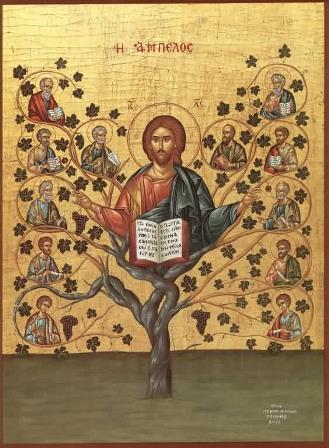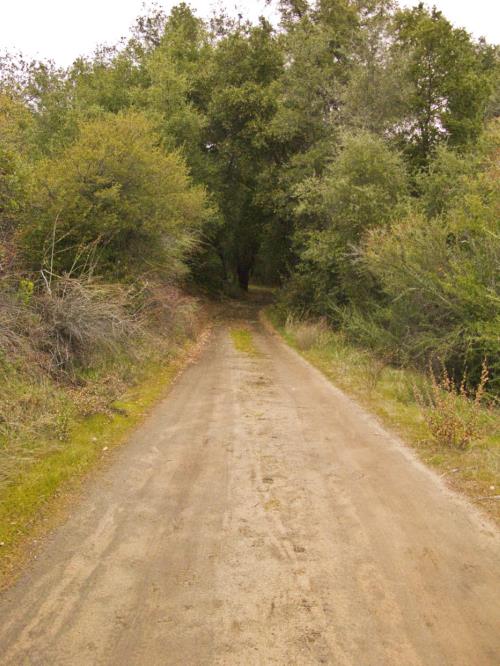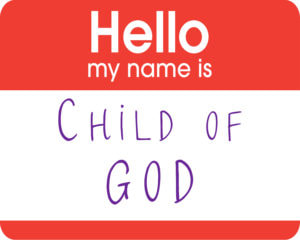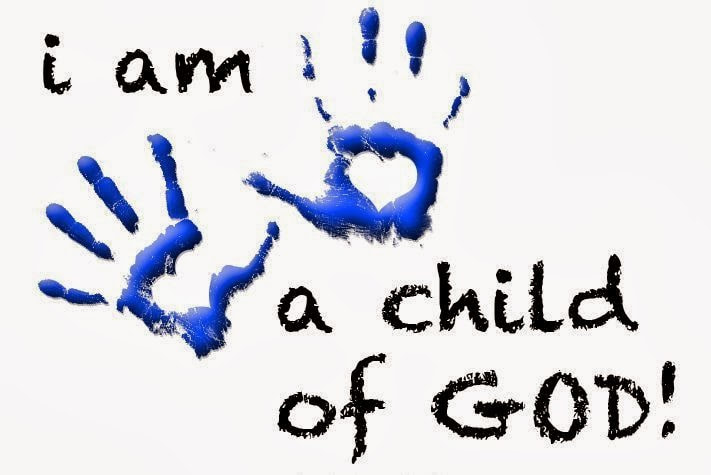Jesus has a good idea about agriculture. It’s a central theme to nearly every story he tells. The people as well are familiar with this image of God as the vine grower. It’s been a part of their scriptures and psalms for thousands of years. For example in Psalm 80 we read, “You brought a vine out of Egypt; you drove out the nations and planted it. You cleared the ground for it; it took deep root and filled the land.” We don’t have to know much about vineyards to understand the point Jesus is making, or to see ourselves in the lesson. It’s pretty obvious what Jesus means when he says “I’m the true vine. You are the branches.” Other than loving the taste of grapes and enjoying a glass of wine every now and then, I learned a few things about vineyards and vines from a winery I did advertising for. I had the pleasure of spending a beautiful day in Sonoma Valley learning about the soil, the climate, and even the stress they put grapes through – each one adding to the unique character of the fruit that is ultimately reflected in the wine. I also learned the best tasting grapes are the ones produced closest to the central vine where the nutrients are the most concentrated. The lateral branches, which are naturally inclined to ramble all over the place, are watched carefully...and guided patiently so they don’t lose their nutrients or become sour. This had me thinking. If the best fruit comes from being closer to the vine, then it should go without saying that we too would do better by being the closer to Jesus, the true vine who said, “Abide in me and I will abide in you. For a branch cannot bear fruit by itself.” Just as the life of a branch is sustained by being connected with the vine, our lives are sustained through a close relationship with Christ. When Jesus says to abide in him, he’s giving us a personal invitation to be with him; to learn from him and to produce fruit like him. When we are connected to Jesus we are able to draw from his spiritual abundance. And bear the fruit of his love. This is an important for us because Jesus is the perfection of God’s love manifested in the world. To abide in Christ frees us to express and share God’s love in the way we live our lives. From our inward emotions to our outward actions, this is how we bear good fruit. Loving and forgiving one another as God has loved and forgiven us. Yet it’s nearly impossible to bear fruit if our branches are not being nourished by a healthy source. Let’s face it, we cannot feed ourselves or even prune ourselves without the help of the vine grower. We need to be close to the source of God’s love and grace so we can become stronger, not weaker; more faithful and not less. The further we are from being in a relationship with Jesus, the more vulnerable we are to the elements in the world that seek to draw us away from loving God; rendering whatever fruit we might be able to grow sour and useless. “Beloved, since God loved us so much, we also ought to love one another. No one has ever seen God; if we love one another, God lives in us, and his love is perfected in us.” (1 John 4:11) John the Evangelist emphatically repeats this idea that God loves us, no matter what. And that God wants us to be a part of the redemptive story. But John also raises a very interesting question: What are willing to do to show God’s love to one another? To love God and be loved by God is one thing. To be faithful to that love is another. You see, our goal is not to remain a scrawny, twisted branch. But to become one with the true vine so that others can sprout their faith and grow in their love. I like to believe heaven happens once the world is tangled up in the vines of God’s love. Our proximity to this love depends not only on our willingness to build a close relationship with God through Christ, but also in our willingness to be faithful, and to share that love with others. The two go hand in hand. As Henry Nouwen wrote, “Giving away our lives for others is the greatest of all human arts. This will gain us our lives.” It seems to me that the more we allow God to snip and prune away our useless branches, the more we grow closer to Christ and to one another. The more creation becomes unified. So it is we all must ask of ourselves, “What is going on in my life, inside my heart and outside in my world, that I need God to prune so that I can abide and flourish in Christ’s love?” Is it an attitude? An addiction? Certain wounds, or pains, or fears? Is it a bad relationship? Or perhaps an unforgiving heart? Maybe you’ve just wandered along the trellis of life but haven’t really gotten anywhere or done anything? Those things no longer matter once you accept the invitation to abide in Christ. Your past is snipped away, allowing your future to bloom and blossom the good fruit. God is here, in the garden, ready to reshape your heart and transform your life with the grace and love that has been given to us through our Lord Jesus Christ. With great patience and perseverance, God is snipping and pruning us for something greater than we can produce on our own: a greater sense of peace; an enlightened path to discern and navigate our way around the vineyard; and a reason to embrace all the seasons of life, from the pruning to the flourishing. God does this for you and me, so all of creation can bear the fruit of love and receive the joy of a blessed life, now and forever, Amen.
0 Comments
It’s funny how God always seems to show up in the most unusual places. And how reassuring it as to hear God’s voice through the tiny speaker say, “In 200 feet turn right.” It was as if the trees had parted and the cellular light shone upon us. Lo and behold a small mountain road appeared. And we faithfully turned right, following it blindly all the way to the airport. The rest of my family would not be so lucky. Apparently there was a bad accident on the interstate that caused a huge traffic jam. They all missed their flights home. Over 6,000 years before cellular technology, a poet wrote these words, “The Lord is my shepherd, I shall not want.” I have often read the 23rd Psalm at funerals and at the bedside of the sick and dying because it speaks so well to the peace and joy that God provides. The psalmist paints a symbolic and tender picture of a God comes to us, and gives us comfort and hope in our time of need. I think that poet were to write this today, he might describe God as our GPS who leads us to out of the way places so our souls can find peace and rest, and our thirst can be quenched without fear or worry. No matter how dark or scary the journey might seem, God leads the way home where a hot meal and comfortable bed awaits. In John’s gospel, Jesus builds on this theme too. And I think it’s safe to say he is our G.P.S. as in he is the Good People Shepherd; the one God sent to gather the sheep, to care for them and keep them safe. Many years ago, Pope John Paul II said, “God has thought of us from eternity and has loved us as unique individuals. He has called every one of us by name, as the Good Shepherd calls His sheep by name.” We are God’s sheep who looked after by a Good People Shepherd. Thanks to my smart phone, I now know a few things about sheep. First, they’re smart and very perceptive. They know their shepherd by the sound of his voice, and even his scent. Second, they do not just blindly follow as the old maxim suggests. Sheep follow their shepherd willingly because he has spent his life living with them, looking out for them, building a relationship of trust with them. The Good Shepherd knows which ones are cranky in the morning and which ones lag behind or wander off. He knows this because he’s chased after them; fallen in the mud with them; picked thorns from their hoofs; and chased off wolves. He has learned to love them in spite of all their noisy bleating and baaing. We are God’s sheep, and we are called to follow, not blindly but willingly, because we know what God is willing to do for us no matter the cost. The Bible tells us that when we follow the Good Shepherd, we are less likely to wander of the righteous path where the mental wolves of the world want to steal and scatter us. But we all wander off from time-to-time. And eventually each one of us will get lost. How blessed are we to know that we have God’s GPS, the Good People Shepherd, to get us back to where we ought to be. Today there’s a standard feature that comes on all iPhone called, “Find my phone.” It’s there for the off chance that my phone should get lost or stolen. Humans also come equipped with similar technology. Being made in the image of God is like having a divine chip implanted in us so we are always on God’s radar. God always knows where we are, because God is always with us – whether we know it or not. Jesus, our Good People Shepherd, comes and retrieves us when we are lost. When the world steals us away, Jesus finds us and guides us back to the right path. Sometimes our life will take us through the darkest valleys and the desolate mountain roads, but God is always with us, to navigate the way. As we move through the Easter season, may we come to know Jesus not just as the Good Shepherd who knows his sheep, but also as the divine GPS who implanted our lives into his. Just as he has laid down for his life for us, so too will Jesus lift us back up again. Jesus not only brings us with him, but sits us down with us at God’s table so we can receive grace-upon-grace until our cup overflows. Through him, we are invited to “dwell in the house of the Lord all the days of our life.” No matter how advanced technology will become, it will never be able to do for you what God has already done for all through Jesus. Prayer: Shepherd of all, by laying down your life for your flock you reveal your love for all. Lead us from the place of death to the place of abundant life, that guided by your care for us, we may rightly offer our lives in love for you and our neighbors. Amen.
This is a big sentence – a powerful, game-changer for anyone who takes these words to heart. Our creator, our redeemer and the giver of all of life’s blessings, has adopted us into this divine family. And as God’s children, we receive an incredible inheritance…a gift above all gifts. We don’t need the right family name or have the right social status to benefit from this gift. And for some, that comes with a great sigh of relief. As for me, I was born a Macdonald – the forth of four children who are all distinctively different. I can’t complain. Our parents were good to us and raised us well. And believe it or not, we all still love and support one another despite our differences or distance that separate us. But I feel doubly blessed because I have also been adopted into my wife’s family. And I also had the privilege to learn from her dad, whose birthday was two days ago. There have been times that I’ve wondered if becoming a part of this family was more a curse than a blessing. But that’s another sermon, for another time and place. I remember asking Vince for his blessing to marry Kathleen. He reached out his hand and said, “It would be an honor to call you my son.” Whenever I look back on that day, I can still see the sparkle in his eye and his smile, and I hear the Irish lilt in his voice. I’m not sure if God has an accent, but I imagine the same sparkle and smile when he claimed me and named me his own. As we all know, families can be difficult and complex. Some of us are blood related. Others blend in. Then there are those who join through marriage, adoption, foster care, or simply having known a person all your life. But the bible tells us that there is another way. Where family trees and genetic research fall short, God has redefine and reclassify us all – inviting us into a new kind of relationship, with a new birth certificate and a new name as well: child of God. Whether you grew up rich or poor, had a stable home or moved between houses every other weekend, God has claimed you and named you. Whether you know your biological dad or not, or still have no idea where your mom is after you stopped talking to her, God has claimed you and named you; even if no one else will. Whether you’re the only child – or one-of-nine like Kathleen – God has made a place for you. It doesn’t matter if you are married with children, a single parent or have never known the excruciating pains of childbirth, we all share a commonality; each one of us knows what it’s like to be a child. But do we know what it’s like to be a Child of God? We don’t get to pick our family. But for some strange, God has decided to pick you and me to be in his. From the time of our conception to the passing of our final breath, God is with us, claiming us and naming us, and is never letting go of us! In his book Barking at the Choir, Fr. Greg Boyle tells of an ex-gang member who, at the age of seven, watched his mom pack up a suitcase and walk out the door. He never saw her again. After surviving two years on the streets, he was picked up and put into the system. Not long after that a local gang adopted him as one of their own. After serving time, the young man entered a work release program at Homeboy Industries; a place started by Boyle to help gang-members get a second chance. They too made him one of their own. Today he no longer identifies with abandonment or violence; but instead he sees himself as claimed and named: a child of God. Every childhood is different. Yet every child is loved the same by God – our eternal parent, both creator and guardian. Boyle writes, “Like a caring parent, God receives our childlike painting of a tree –which is usually an unrecognizable mess – and he delights in it.” God doesn’t correct us or send us away until we’re better at finger painting…God simply delights in our presence. And loves us in all our messiness. Being in God’s family we receive more than just new self-worth. We also receive the same Spirit and the same access to God that Jesus had. We are given the same power to forgive and the same freedom to love. The Bible says we’ll be like him – that when we’re one with Christ, we become right with God. John writes, “Everyone who does what is right is righteous, just as he is righteous.”
Named. Claim. And made the same as Jesus, a child of the living God. How difficult can that be? As Kathleen says, “Adulting is hard!” But the bible tells us we should be more like children and less like grown ups. I coach PE at my kid’s school and I’d argue that children work and play together better than most adults do. They’re better able to embody a newness of life and the spirit of freedom that often fades with maturity. They accept mystery but constantly seek answers to so many questions. More importantly, children are also more willing to be loved, and they tend to gravitate towards good relationships where that love can thrive. A family is supposed to be such a place, but for too many people family life is more hellish than heavenly. The more sin and pain we experience in our lifetime, the more likely we are to deny God’s love for us. Yet it’s in that pain we need God the most. Adulting is hard because most of us trust our painful experiences more than we trust the promises of God. We put more faith in the sorry facts of our broken lives than we do in the One who heals us and remakes us new again. Scripture teaches us that sin blinds us of the truth that God’s grace and love is grater than anything we can do on our own. And as much as we seek to be in a loving relationship, we still runaway from our heavenly home. “The truth is: God is too good to be true. And whenever we humans bump into something too good to be true, we decide it isn’t truth.” [Boyle] But here’s what I believe, and I hope that you will etch it into your heart: God chooses to be in a relationship with you. God wants you so badly that he sent his own Son to open up a way for you to thrive in Divine love, and inherit all the treasures of heaven. Because of the faith and sacrifice of God’s beloved child, we have been claimed, named and made the same as Jesus himself; who is One with God our eternal parent – a loving father; a nurturing mother; our divine creator all in one. So basically Dad, it’s impossible to get you anything for your birthday because in Christ Jesus, God has given you, and the entire world, the greatest birthday gift anyone could ever receive: being one with God. Works Cited Bartlett, David L., Barbara Brown Taylor. Feasting on the Word, Year B, Vol. 2. Louisville: Westminster John Knox, 2008. pp.418-23. Boyle, Gregory. Barking at the Choir: The Power of Radical Kindship. New York: Simon & Schuster, 2017. p. 22. Last week I stated the resurrection story was a perfect set up for a practical joke, and for that the many doubters out there probably had a good giggle. I didn’t say it to be silly or flip, or simply because it Easter was also April Fools Day. I had simply acknowledged the fact that God has a magnificent sense of humor. If you don’t believe me just ask a platypus. Or my son, Sean. They both are creations of God’s silly imagination.
The great English author C.S. Lewis once said, “Christianity is a religion with both room and reason, for laughter as well as life.” If we believe God gave us the gift of life, especially the resurrected Easter life, then it shouldn’t be too hard to believe that God also gave us laugher. I think Jesus might agree that we need more of it in the church. After all, he said if we grown up’s want to get into heaven we need to be more like children who laugh an average of 300-400 times a day. Adults, on the other hand, produce a paltry 26 giggles or snorts at best. What’s wrong with us that we take life too seriously to enjoy it? Not only is laughter free and fun, but it also releases endorphins that stimulate our blood to keep our hearts healthy; reducing stress, pain and conflict. It’s as if God gave us laughter as a gift for healing. Look, I think God wants us to laugh and is joining in on the fun as we celebrate “Holy Humor Sunday” with churches across the country. Long before there were old punk rock ministers holding internet services, the early church set aside the Sunday after Easter as a day to gather with the faith community to tell jokes and sing silly songs. It was designed to be a continuation of the joy and celebration of Easter – honoring the supreme joke God played on death. Besides the health benefits, laughter is good for the church in that it has the power to draw people in and make everyone feel included. I can’t think of anything that unites us better than some good humor. Everyone know a good joke does not discriminate. A good religious joke welcomes all denominations - $1, $5, $10, $20, $50, $100. There’s nothing like sharing a good laugh with someone to make you feel closer to them. When I was helping my mom set up her iPhone I actually L-O-L’d when I discovered her password was: Mickey-Minnie-Pluto-Huey-Louie-Dewey-Donald-Goofy-Tallahassee. When I asked why she had such a long password, she said it was supposed to be least eight characters long and include one capital. Of course, Holy Humor Sunday is not just about the cheap laugh or the poor pun. None of the silliness that we celebrate today would be possible without the seriousness of Easter and God’s great love for us that came into this world for our redemption. The church needs to be a funny place It needs to be a sanctuary of laughter and where joy is freely shared – especially in times like ours where more people struggle for answers, to make sense out of where they are in their life. Too many remain blind to the grace that is in right there in front of them because they continue to doubt the power of Easter and God’s love in their life. In light of John’s gospel this morning, I’m compelled to ask, “Can anything good come from doubt?” I once met a guy who caused me to question what I thought I knew to be true. His name was Joe. He introduced himself to me as “The only man in the world that everyone knows.” When I asked him to prove it, he walked me around the party and everyone said, “Hey, Joe!” Obviously I wasn’t impressed because they all knew me too. So we left the party and walked about the town where everyone kept saying, “Joe! How ya doing?” The shopkeepers, the police, and firemen, and even the mayor at City Hall all greeted Joe by name. Yet I still wasn’t 100% convinced. So we drove to Sacramento where the governor came out to met us shouting, “Joe, what a pleasant surprise.” From there we flew to Washington DC. A cabbie pulls up and says, “Hey, Joe get in.” Even when we walked into the Oval Office, the president even exclaimed, “Boy Joe, am I glad you came.” But I still had my doubts. There had to be at least one person who did not know this guy. I threw a hail Mary and off to Rome we flew. It was there, in the Vatican, that Joe stopped me in front of St. Peter’s cathedral. “Here’s the deal,” he confessed, “in fifteen minutes the Pope is going to go out on that balcony and give a sermon. He doesn’t like having a lot of visitors before he leads service, so you need to stay out here. If he grants me a visitation, you’ll know.” True enough, about fifteen minutes later the pope came out, waving to the crowd. I stood there in shock and disbelief, as the man standing next to me asks, “Hey mister, who’s that up there with Joe?” Just as we are free to laugh, we are also free to question and doubt God’s love for us. I believe Thomas’ story exemplifies how doubt is good for our spiritual renewal in that it turns our focus inward where God dwells. Our questions and doubts help us find the answers we seek because it begins a dialogue between God and us. You could say our doubts bring us closer to God and closer to finding our true self. And for some strange reason, the church would rather laugh at poor Thomas than learn from him – dubbing him the doubter because he declared, “Unless I see the nail holes and touch him myself, I will not believe.” I think this is unfair and not really funny at all. I’m not so sure Thomas doubted God’s power of the resurrection. Instead I believe he merely desired the blessings that came from the empty tomb. If I were Thomas I too would want what the other Apostles received the week before. He noticed something had changed in them; there was a certain light in their being and joy in their hearts again. I imagine Thomas didn’t want to feel sad or lost or scared anymore. Jesus heard his plea and came to him. He didn’t scold Thomas for doubting, but instead took his pain and fear, and gave them new life, new purpose and meaning. He breathed the Holy Spirit upon him so he could live out this gospel, the good news of God’s love, in the world. In the midst of our fear, in the midst of our trepidation, confusion, grief and loneliness, Jesus comes to us – even when we lock ourselves away, or when we don’t expect him to show up. Jesus came for you and me, and shows us his scars, so we might understand the truth of God’s love for us. He shows us how our painful wounds and scars we bare are made visible to us so that we can see how God resurrects our suffering and transforms it into the glory of God’s kingdom. But best of all, he breathes within us the very breath of life – the Holy Spirit, the great witness of God’s biggest joke of all – the one God played on death so that we might enjoy the gift of real life; Oneness with our Creator. Our laughing is God’s laughter. Our life is God’s joy. And so, together with laughter and joy, our hearts gather freely to worship our Lord and Savior who is alive, and whose Spirit is among us today. Which reminds me of a joke: What do they call pastors in Germany? Why, German Shepherds, of course! Work Cited: I am grateful to Rev. Dinah Haag from First Congregational Church, Frankfort, MI for her inspiration and silliness (https://www.fccfrankfort.org/sermons/sundays-sermon-4-7-13-holy-humor-sunday) and to the many merry pranksters whom I borrowed jokes from.
I can’t think of a better way for Jesus to mock the world that killed him, than to rise from the dead. Of all the jokes I have played on others or the many jokes that had been played on me, nothing came close to what God pulled off on Easter Sunday. I’m not so sure Mary or the others saw the humor in God’s little prank. I doubt anyone was laughing when they ran to the tomb or saw that the stone had been tampered with – and for good reason. You see, the religious and political leaders came together one last time and agreed that the tomb should be sealed to make sure no pranks could be had. The women knew the rules: if anyone broke the official seal, they would be found liable of treason and death. Now imagine getting arrested for playing a practical joke – the Whoopie Cushion industry would be out of business. Joy buzzers would be banned, and comedy clubs would be pushed underground. But this doesn’t stop Mark, or the other gospel writers, from adding a little comic relief to this very serious story. Take, for example, the young man who was dressed in a white robe. Was he just on the way to a bath when he stumbled upon this open tomb? Can we safely assume this guy is an angel if for no other reason than he greets the women with the first rule found in the Angel’s Handbook, “When coming in contact with a human being, be sure to remind them not to be afraid, other wise they might freak out.” “Do not be afraid.” You have to admit there is something funny about that. Mary witnessed her friend’s execution because of his religious beliefs, and now his tomb has been tampered with. And his body is missing. If you’re not supposed to be afraid in a situation like this then what should you do? Laugh? They were terrified, and ran away. Can you blame them? As Barbara Brown Taylor muses, “Once a human being goes into the ground, that is that. You do not wait around for the person to reappear so you can pick up where you left off- at least not this side of the grave. You say good-bye; pay your respects; and go on with your life as best you can." Nowhere in their wildest imaginations did these women expect Jesus to jump out from behind the rock and shout, “Smile! You’re on Candid Camera.” Jesus’ death was real. And his resurrection was no joke. In fact, it was the centerpiece of his incarnation and the entire purpose of his ministry. All that God was doing in the world was leading up to this one single event. Why is this important for us? Richard Rohr describes it best when he reminds us that, “The resurrection is God’s pledge and guarantee of what God will do with all our crucifixions.” In other words “all our hurt become the home for our greatest hope.” A new life in Christ. Resurrection is the proof that “life itself” is what God cherishes the most. Jesus conquered death so that we may live to do God’s will. Despite the pain and suffering we might endure, we can still love our neighbors, and seek justice in an unjust world because Jesus was resurrected – causing a divine shift in the way the world is ordered. His destiny is our destiny. His life work is now ours. His resurrection is an invitation for us to share a new life with God in the same close relationship that he himself experienced with God. I now know his amazing gift is not simply a bridge between death and life; it’s a shared connection with a God who loves me just as I am. And that too makes me laugh. Who am I to deserve such grace? Have you ever felt that way – unworthy or unforgivable? Mary Magdalene did. So did Peter and all the others. This is why it’s called the Good News. What’s that saying? “God loves us where we are, but loves us too much to leave us there.” Surprise! Resurrection! Now that you know what God is willing to do for you, what then should you do? Might I suggest you roll back the stone that is keeping you from welcoming God’s love and grace into your life. Despite your shortcomings or lack of commitment to God, God still remains committed to you, and loves you unconditionally, just as you are. Take a look inside that dark tomb of yours. Whatever you have going on in your life ask God to resurrect it and transform it into something meaningful and truly life giving. And you might want to try turning your ear towards the angels that God has provided for you. Hear what they say. And be not afraid. Instead of looking for Jesus in all the stuff in your life that represents death,… seek to be like Jesus, and live as he did, in every aspect of your life. Remember the women did not find a decomposing corpse. They found an empty tomb! And soon all of his followers would discover that Jesus not only walks among us, but he also walks through us so that others may come to see in us God’s amazing power and receive the great Easter gift for themselves.
|
Rev. Ianhas been blogging under the name: Jesus not Jesús: Looking for Christ in the face of strangers. You can read his posts and browse his archives by clicking here. Sermon Archives
November 2021
Worship with us live on Facebook
Sunday at 11:00 a.m. |
||||||||||||||||||||||






 RSS Feed
RSS Feed

